How to Start an E-Waste Recycling Business in India?
E-waste, The Fastest Growing Waste Stream: E-waste accounts for the fastest growing waste type, especially as of now. Communication and information technology has seen a huge amount of growth in the last decade and worldwide. Here, we will focus on how to start an e-waste recycling business in India.
People have adopted electronics in their everyday lives up to a huge extent, and no work is perceivable without the use of electronics. There is a noticeable growth in the investment in electronic products that resonate with innovation because of increased demand by the people. And, Because of this ever-changing innovative progress in electronic gadgets and equipment, a voluminous amount of E-waste is generated.
Medical equipment accounts for 7 percent, Electrical equipment accounts for 8 percent, telecommunication equipment accounts for 12 percent, and computer equipment accounts for a whopping 70 percent of E-waste.
Table of Contents
- 1 The presence of E-waste is an Opportunity for Entrepreneurs:
- 2 E-Waste Recycling Process:
- 3 Metals Obtained After E-Waste Products
- 4 Unlocking the Opportunity In-Store Ethically
- 5 Business E-Recycling Models:
- 6 Steps to Follow When Going into The E-Waste Recycling Business:
- 7 Pioneers of The Indian Market of E-Waste Management
The presence of E-waste is an Opportunity for Entrepreneurs:
All forms of E-waste naturally are a huge environmental hazard, but these provide a huge opportunity for entrepreneurs who are willing to leap of faith. If we only talk about India, it is the fifth-largest producer of e-waste across the globe, and this generation tends to grow annually at a 30 percent rate.
It is bound to touch 5.2 MT per annum by 2020, contrary to the current level, which is at 1.8 million metric tones. While the numbers can look intimidating, these numbers represent huge business opportunities in recycling electronic waste.
E-Waste Recycling Process:
E-waste recycling, starting from the collection of waste to the final material processing, involves many steps and is highly labor-intensive. If someone isn’t aware of the business’s processes and technicalities, they will always be stuck on the question of how to start an e-waste recycling business in India.
There are various kinds of electronic wastes, and different kinds of processes are used to recycle them that have mentioned in the table below.:
| E-waste components/products | The process used for recycling |
| A printed circuit board (a thin place on which electronic components and chips are placed) | Desoldering and removal of computer chips is the first step. To remove metals from the chips, it is treated with open burning and acid baths. |
| Cathode ray tubes (used in computer monitors, video cameras, TVs, ATMs, etc.) | Removing and breaking yoke then proceeding to dump |
| Chips and other gold-plated components | Burning and us of Nitric and hydrochloric acid to chemically strip the chips. |
| Computer wires | Stripping and open burning to remove copper. |
| Plastics from printers, monitors, keyboards, etc. | Low-temperature melting and shredding for reuse |
Metals Obtained After E-Waste Products
How to start an e-waste recycling business in India can be a question running through a young entrepreneur’s mind if they are not well versed with the by-products and metals obtained after recycling.
The table below mentions Electronic waste products and the metals that are recovered after recycling these products.
| Electronic waste products | Metals recovered after recycling the products |
| Lithium-ion batteries | Lithium |
| Nickel-cadmium batteries | Nickel |
| Connector plating is mainly used in computer equipment. | Gold |
| Printed circuit board tracks, component leads, copper wire. | Copper |
| All electronic devices that use a few watts of power | Aluminum |
| Transistorized electronics | Germanium |
| Glass, transistors, ICs, printed circuit boards | Silicon |
| Plating for steel parts | Zinc |
| Coatings on component leads, Solder | Tin |
Unlocking the Opportunity In-Store Ethically
The industry potential in this field is still untapped up to an extent, and a lot of people are emerging to make the best use out of this abundant resource.
Any industry and field are bound to exploitation if not regulated well by the concerning authorities. Some participants tend to take unethical ways and shortcuts. To minimize this, a certain e-certification is provided to those interested in ensuring they have gone through a rigid certification process. It also indicates that they are doing the right thing.
Business E-Recycling Models:
Self-Owned Operation:
In this operation, waste management can be done through the purchase of waste from various sources. In this model, the entrepreneur, who is also the primary investor, has to bear the entire cost by himself if the operation incurs any loss.
A calculative model of self-owned operation with a business unit that is capable of generating revenue of 6-7.5 million Rs/month is given below:
Capital Expenses:
- Plant and Machinery: 3.5 million rupees.
- Land: 20,000 sq. ft. in the beginning.
Operational Expenses:
An estimate of 4 million Rs/month will be spent on operational expenses that include:
- Cost of scrap.
- Logistics expenses.
- Marketing expenses.
- Human resource cost.
- Contingency expenses.
- Spares and consumables.
Calculation of Revenue:
Example: For a 1-tonne personal computer, PGM (Platinum-Group Metals) recovery can be completed from PCBs, the calculation of revenue is given below: (Always remember prices can go up and down):
- For Gold (gm), if the metal recovered is 390 kg/tonne at Rs’ rate. 3000 per kg, the total value becomes 1,170,000.
- For Palladium (gm), if the metal recovered is 90 kg/tonne at Rs’ rate. 1200 per kg, the total value becomes 108,000
- For Silver (gm), if the metal recovered is 5 kg/tonne at Rs’ rate. 47,047 per kg, the total value becomes Rs. 70,571.
- For copper (gm), if the metal recovered is 190 kg/tonne at Rs’ rate. 435 per kg, the total value becomes 82,650.
- For Lead and Tin (gm), if the metal recovered is 31 kg/tonne at Rs’ rate. 233 per kg, the total value becomes 7,223.
- For Aluminum (gm), if the metal recovered is 145 kg/tonne at Rs’ rate. 103 per kg, the total value becomes 14,935.
- After including other metals obtained per ton of PCB (10,000), the Total value is 1,463,379 (Adding all above values).
PCB (Printed Circuit Board) accounts for 4% of the PC approximately. So, for above example 1-tonne Personal Computer PCB will be 1-tonne * 4% = 0.04. Therefore, income generated from above example = Rs. 1,463,379×0.04= Rs. 58,535 (per 1-tonne).
Franchisee-Based Operation:
In this operation, the waste is managed by the enterprise, being a franchise unit of an electronic waste management company that is already established.
The franchise model is suitable for entrepreneurs who are not ready to incur huge investment losses and have a low investment threshold. The franchisee unit tends to benefit from the infrastructure of the parent company. Hence, capital expenditure and operation expenditures are lower in comparison to the self-owned business model.
A rough estimation of the numbers of the franchisee model is given below:
- Area: 1000-1500sq.ft.
- Investment: Rs. 700,000-800,000.
Steps to Follow When Going into The E-Waste Recycling Business:
Demand for E-Waste Recycling Business:
For electronic waste in India, there is a very high demand for such recycling businesses. There is a huge market to be explored in this field.
Familiarizing Yourself with Business Terms:
Someone interested in this business must know it through and through. Intensively researching through the internet and visiting recycling business houses can make you aware of the profits and losses.
Segregating Useful from Useless:
A process to separate the useful from users should be developed so that the same thing can again be refurbished into a useful product.
Pioneers of The Indian Market of E-Waste Management
Looking at the stories of common individuals who make it big in the business helps find the answer to how to start an e-waste recycling business in India easier.
Deshwal Waste Management – Raj Kumar
Raj Kumar worked in the IT sector when he observed the e-waste that was increasing and becoming difficult to manage and recycle. He decided to invest his own money after being motivated by the e-waste draft penned by the Centre in 2010 and launched his management business in 2013. He established it in Manesar, where the facility started recycling e-waste like used batteries, plastic, used oils, etc.
His company is now growing at a rate of 50 percent per year with clients from the IT sector, consumer goods, consulting, telecommunications, financial sector, pharmaceuticals, heavy industries, and more.
Deluxe Recycling – Jignesh Shah
Jignesh Shah started his company in 1999, intending to make something that is environment-friendly. He initially started with a small plant over 20 years ago now with investments from friends, family, cash credit, and term loans, with a capacity of only 75 tonnes/month. The capacity of his company has now to expand to 13,000 metric tonnes per annum. According to Jignesh, the chipboards used in auto rickshaws are delivered by them.
Packman- Gaurav Jalan
The objective of Gaurav Jalan Run Company is to protect the environment from the threat posed by plastic packaging. The factory is situated in Greater Noida, and it manufactures corrugated boxes that are paper-based and are available in various sizes and shapes. The company also makes eco-friendly bags out of corn, bubble rolls, courier bags, corrugated rolls, e-commerce shipping bags, duct tapes, POD jackets, and many more bio-degradable and eco-friendly things.

